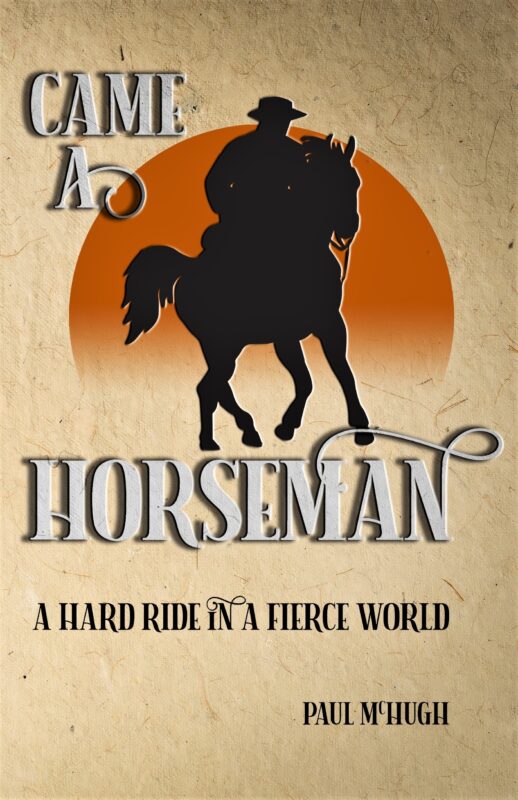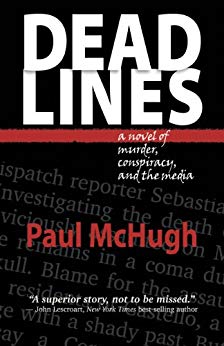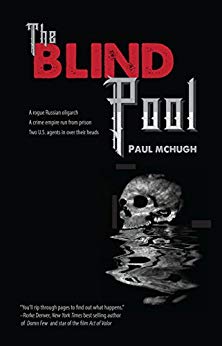Do you possess, or are you possessed by, a red-carpet dream? For some, the fantasy could be actual stardom. Including, let’s say, acquiring a glittering star on that sidewalk by Hollywood Boulevard. (Just don’t let them stick yours down anywhere near Trump’s star – that wacko wildly swinging a pickax just might accidentally hack yours up, too.)
For others, only a basic recognition may be enough. No tinsel or trappings required. (Although stuffing a check in the envelope is commonly appreciated…)
At the 2019 Chanticleer International Book Awards in April, as I heard these words called out – “’The Blind Pool,’ by Paul McHugh” – I felt a bit of a thrill, no question. It was also delightful to walk through an applauding crowd of other writers, ascend the stage and score a blue ribbon with the legend, “First in Category – Clue: Thriller & Suspense.” I also won a hug, handshakes, and some highly useful certificates. More on those in a bit.
But my biggest take-away was simple validation. In my mind, that gets filed right next to reader comments such as: having two investigative journalists from Russia share their judgment that a main villain in The Blind Pool, rogue oligarch Leonid Andreyev, seemed altogether realistic and believable to them. Or having U.S. military veterans say that my heroes Carl Blackadar and Dan Cowell chatted and teased each other in exactly the way that they’d heard special operators talk downrange.
I registered for this Chanticleer Reviews conference and awards banquet in Bellingham, WA, without really knowing what I was getting myself into. But since my political thriller, “The Blind Pool” had already been judged a semi-finalist in two categories, I reckoned my chances of walking that carpet to snag a prize looked fairly good. And since I was burning carbon to get out to Bellingham anyhow, I figured I might as well sign on for the full, three-day menu of events.
Not without trepidation. It would be my first writers’ conference, ever. Long before, I’d bought into Kurt Vonnegut’s line that, “’Writers conference’ is a misnomer, because writers don’t confer. All they do is drag themselves past each other like great, wounded bears.” I found out that Vonnegut was wrong. Not completely, but mostly! Besides the sweet validation that a win for The Blind Pool conferred, I discovered intriguing contacts and conversations, made a new friend or two, scored some cogent writing tips, plus won a valuable intro to the techniques and tools for audio recording – this last from Danish gents who’d flown in to teach us about their Hindenburg software. They also brought Danish cookies for us attendees to munch on… really good stuff!
Writing Tips

Among writing luminaries Chanticleer Reviews brought on board was Jessica Page Morrell, a coach and self-described “book doctor” who has a half-dozen volumes out on tips and techniques for vivid story-telling. I took two of her classes, and found her theories dovetailed neatly with ones I already had going.
Sensual detail – lure the reader into scene and setting with appeals to all the senses. (But I particularly reserve sense of smell to a character I wish my readers to identify with.)
Vibrant language – the true powerhouse words are verbs, particularly those that have a metaphorical quality, i.e. instead of simply running, a character can sprint, gallop, or his legs can windmill down the path. But watch out for adverbs; they’re plutonium, so deploy them with care! Anything that ends in “ly” should be handled with tongs.
Character arcs – I and Morrell both believe that the best plots hinge on character development (or destruction). In other words, your principal crisis should force characters to decide who they will be. However, in special cases strong characters can remain static, i.e. Atticus Finch in To Kill A Mockingbird. There, drama comes from seeing if Atticus can keep strong and steady, despite all his multiplying challenges.
Threshold event – Nothing gets a story going quite as well as an upset applecart. (The old saw about Western novels is: You always want to shoot the sheriff in the first paragraph.) The reader then accompanies the protagonist into a changed world, or even one knocked over onto its ear. Frodo leaves the Shire, the stormtroopers invade Tatooine, Harry finds out he’s going to Hogwarts. This is reminiscent of Gardner’s idea that, “There are only two stories: a stranger comes to town; or someone undertakes a journey.” The key is making such a shift in circumstances seismic, dramatic, and thus highly attention-grabbing.
Tension building – There are many ways to build tension in a story, and you should use all of them! Not just the overarching theme of what might happen ultimately to the characters a reader cares about, but what will occur if one opens a closet door? What will she say next, and how will it be taken? Does that broken lock or window mean something? And how about that odd noise? Tension need not be unpleasant – sexual yearning, for example, is one of the great engines of storytelling. As is hunger of any sort: for simple food and drink, for reliable companionship, for safety, for truth and for freedom.
Can You Hear Me Now?

The first line of the mission statement for Hindenburg Systems is: “… to tear down the technical divide between storytellers and their audience.” With the growth of audiobooks and podcasts, this is an important area where writers should definitely try to score a few victories.
Top reps from this Danish firm showed up at Chanticleer’s conference to give multi-media presentations on two of their audio recording software systems. And also – apparently – to entertain us. Chris Mottes, a partner in the firm, is the funniest Dane whom I’ve seen take a stage since Victor Borge. Their keyboards were quite different, of course, but this guy is a laugh riot. Luckily, I made a point of sitting right up front, where I could hear not only his public jokes but also the sotto voce comments Chris made under his breath… which were as funny or funnier.
Another point I want to make high up here is that these guys speak English very, very, very well. So if you’re worried about tech support? Don’t bother. They’ll get your meaning, and your nuance. Save worry for something else, like the 2020 U.S. election.
The main theme of their presentation, though, is that they designed their systems to be clear, clean and intuitive. So much so, you won’t need tech support anywhere near as much as you might fear. In line with that approach, they also provide abundant online tutorials.
As Chris said at Chanticleer, “Before this, most audio interfaces were designed for an engineer to look at, not a reporter, an author, or podcast amateur. Well, we aim to change that.”
In this space, I won’t attempt to fully describe their products. I won’t even try to summarize them minimally.
I’ll just say that, I worked with the systems, and Hindenburg Journalist and Journalist Pro look like excellent ways to create audio stories and podcasts. Hindenburg Narrator appears to me to be a fine way to record your own audio book.
What makes these systems so good? I’ll offer two examples. H-Narrator can key your audio file directly to your text manuscript on the same screen, so that you can read while you record. And for both systems, you can craft a Voice Profile that renders everything that you record consistent throughout. In other words, the end of your book will sound like the beginning. And the middle too, for that matter! And if you like it, go ahead and apply the profile to your next book – and thus establish your brand.
Hindenburg offers 30-day free trials of their systems. Get to know the company and check ‘em out at: https://hindenburg.com/
Sadly, I don’t think you can get them to send you any Danish cookies by this method. But heck, go on and bug them to see if it works. These gents do try to be helpful. And did I mention, funny?
Hope is a Thing with Stars

The moon might indeed be a harsh mistress. But she’s nowhere near as tough or temperamental as a writing career! That’s why it’s important to occasionally brush shoulders with those who’ve found a way to charge up onto and then occupy a plateau in the Promised Land of story-telling success. The Chanticleer conference gave us two of these, independent Hollywood producer Scott Steindorff, and best-selling horror/fantasy author J. D. Barker. Both offered cogent updates on the contemporary story-selling scene from their unique and elevated perspectives. I won’t attempt to reproduce their comments here, just thank them and congratulate them for reaching back into the seething mosh pit of other scribblers, and so provide us all with that vital ingredient, Vitamin H. By which I mean: Hope.








